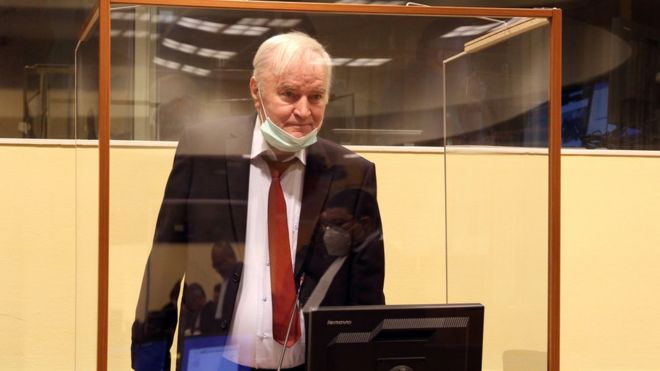Bosnian war: Ratko Mladic appeals against genocide conviction

Ex-Bosnian Serb commander Ratko Mladic is appealing against his conviction for genocide and crimes against humanity at a court in The Hague.
The two-day hearing began after it was delayed several times because of Mladic's health issues and the coronavirus pandemic.
The 78-year-old led forces during the massacre of Bosnian Muslims (Bosniaks) during the 1990s Bosnian war.
Known as the "Butcher of Bosnia", he was jailed for life in November 2017.
As Tuesday's session began, Mladic's lawyers told the UN court that the proceedings should not go ahead until a medical team had reviewed his capacity to take part.
Mladic will himself speak for 10 minutes on Wednesday, and he appeared in court for Tuesday's session wearing a surgical mask, while most of the judges took part via video link.
His son, Darko Mladic, told the AFP news agency that his father "hasn't been able to prepare" for the appeal hearing due to his health issues.
"He doesn't have the energy needed for work of this kind and there are questions about how well his memory is working," he said.
Mladic, who earlier needed an operation to remove a benign polyp on his colon, had a request for a delay on health grounds rejected ahead of the hearing.
The Mothers of Srebrenica, a group of women related to victims of a massacre in the town in 1995, said the tribunal "must not lose motivation, and must carry out its mission".
"We hope Mladic will be found guilty for genocide in other towns as well," Munira Subasic, the organisation's president, told AFP.
What was Mladic convicted of?
Mladic was the military commander of Bosnian Serb forces against Bosnian Croat and Bosniak armies. He had been on trial at the International Criminal Tribunal for the former Yugoslavia (ICTY) since 2012 prior to his conviction five years later.
The court found that he "significantly contributed" to the genocide in Srebrenica in 1995, where more than 7,000 Bosniak men and boys were murdered, the worst atrocity in Europe since World War Two.
The other charges included war crimes and crimes against humanity.
He was cleared of a second count of genocide in other municipalities. The court will hear an appeal by prosecutors against this acquittal this week.
At the end of the war in 1995 Mladic went into hiding and lived in obscurity in Serbia, protected by family and elements of the security forces.
He was finally tracked down and arrested at a cousin's house in rural northern Serbia in 2011 after 16 years on the run.









Comments